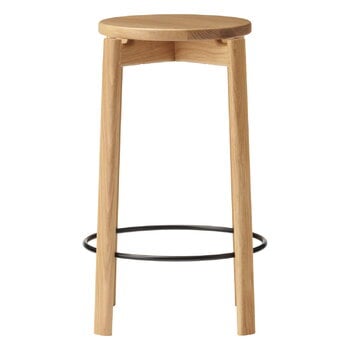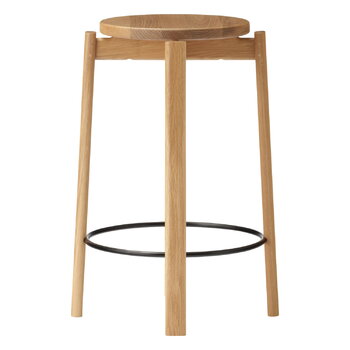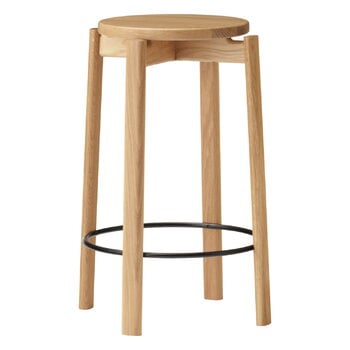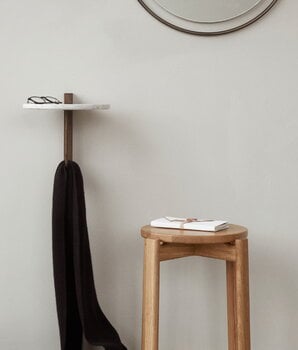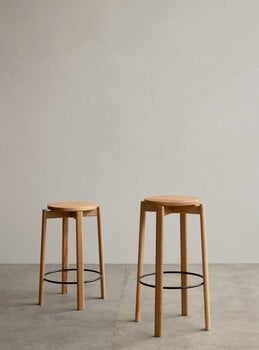Audo Copenhagen's Passage counter stool infuses your home with Scandinavian elegance with its softly rounded shapes and high-quality materials. Designed by Kroeyer-Saetter-Lassen, the counter stool is made of FSC-certified oak wood, whose natural grain emphasizes the stool's warm and authentic expression deeply rooted in Scandinavian minimalism. The Passage counter stool is suitable for high dining tables and kitchen counters at home, and can also be used in restaurants, bars and other public spaces.
Passage counter stool, 65 cm, oak
Audo Copenhagen
Description
Audo Copenhagen's Passage counter stool infuses your home with Scandinavian elegance with its softly rounded shapes and high-quality materials. Designed by Kroeyer-Saetter-Lassen, the counter stool is made of FSC-certified oak wood, whose natural grain emphasizes the stool's warm and authentic expression deeply rooted in Scandinavian minimalism. The Passage counter stool is suitable for high dining tables and kitchen counters at home, and can also be used in restaurants, bars and other public spaces.
Product details (6)
- Colour
- Oak, black
- Height
- 65 cm
- Diameter
- 46 cm
- Seat depth
- 33 cm
- Seat height
- 75 cm
- Material
- Oak, powder coated steel
- Product ID
Designer
Kroyer-Saetter-Lassen – or Krøyer-Sætter-Lassen in its Danish form – is a Copenhagen-based design studio founded in 2016 by Mads Sætter-Lassen and Emil Krøyer, both graduates of the Royal Danish Academy of Fine Arts, School of Design. The duo’s approach to design is honest, based on their strong cultural understanding and Danish design heritage. In their products, Krøyer-Sætter-Lassen strives to combine art and functionality.
View all productsReviews (1)
5
Based on 1 reviews
-
M
Marta T
Capaci, Italy
E’ bello e solido. Sono contenta
268 days ago
Sustainability
The Product Sustainability Framework, our criteria of sustainable design, helps you find the most sustainable products in our selection. Read below which sustainability criteria this product has met.
Working conditions & labour 7/9
-
Equal opportunities for all employees
-
Commitment to UN Global Compact, fair compensation for all employees
-
Corporate responsibility requirements defined and communicated for suppliers
-
Systematic work for improved inclusion and well-being in the workplace
-
Transparent supply chain
-
Suppliers' compliance to a code of conduct ensured
-
Compliance to the UN Guiding Principles on Business and Human Rights ensured in the supply chain
-
Direct suppliers audited and certified
-
Support for community involvement in the supply chain
Eco-friendly production 8/9
-
Fair and resource-wise water-use in production
-
No incineration or landfilling of returned items
-
No use of endangered species as materials
-
No direct environmental emissions or waste (excl. GHGs) from production
-
The sustainability of direct suppliers' production is addressed and monitored
-
Production and material sourcing that respect biodiversity, animal rights, and natural ecosystems
-
Material-efficient and ecological packaging
-
No potentially harmful chemicals used in own production
-
Positive impact on nature’s well-being through operations that regenerate natural ecosystems
Climate impact 4/8
-
Company's direct greenhouse gas emissions identified and commitment to reduction
-
Product's carbon impact identified and commitment to reduction
-
Guidance on energy- and eco-efficient use of the product
-
Carbon footprint of the product calculated and goals set to reduce it
-
Contribution to climate initiatives beyond the brand’s direct operations
-
Low-carbon or compensated transportation
-
100 % renewable energy in own production and operations
-
Carbon neutral or carbon negative product
Sustainable materials 6/6
-
Sustainable and long-lasting material choices
-
No harmful or hazardous substances
-
Responsible raw material sourcing and production
-
Materials suited for circularity: monomaterials, recyclable finishings, renewable or recycled contents etc.
-
Ecological materials: natural, biodegradable, recyclable or recycled contents
-
Outstanding materials in terms of innovativeness, responsibility, sustainability and circularity: local production or sourcing, 100 % recycled content, C2C-certification etc.
Circular design 4/5
-
High aesthetic quality promoting long-term use of the product
-
Technically durable product design and material choices
-
Design for enduring life-long quality
-
Design and support for product maintenance, repair and upgradability
-
Innovative circular design solutions: circular service system, resale platform, remanufacturing, collection of used products, etc.
